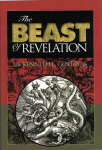MISUNDERSTANDING “LUCIFER”
PMW 2023-039 by Kenneth L. Gentry, Jr.

Isaiah’s prophecy regarding “Lucifer” (Isa. 14:12) is a fairly well-known passage in the Old Testament. Unfortunately, among most Christians and in much of popular culture it is widely misunderstood. In this article I will give a brief survey of the relevant verses in Isaiah 14, which should re-direct your thinking if you understand Lucifer to be Satan.
Isa. 14:1–4: When the LORD will have compassion on Jacob.
These four prose verses show that the preceding poetic movement has ended (see 13:1–14:23 Note). The next movement begins in v. 4b. Both movements are directed against Babylon (vv. 1, 17, 19; 14:4, 22). Though Israel will be banished from her land by Babylon (see Isa. 6:12 Note), God will bring her back (vv. 1–3). Her future return from exile echoes the original exodus from Egypt and serves as a new hope-filled beginning for her. And this even looks further into the future to her ultimate “exodus” from the bondage of sin under Jesus as he calls out a new “Israel of God,” which is a being formed as a “new creation” (Gal. 6:15–16; cp. 2 Cor. 5:17). Jesus speaks of this with Moses at the transfiguration (Luke 9:31; “departure” is the translation of the Greek exodos).
Isa. 14:1: strangers will join them and attach themselves to the house of Jacob.
This is not simply a return of Jews to their original land (though it does speak of the return from Babylonian exile; see vv. 1–4 Note). More distantly and fully, however, the “strangers” here are Gentiles who will become a part of the future “Israel of God” in which circumcision does not matter (Gal. 6:15). this will begin fulfilling the promise of salvation and the inclusion of Gentiles among God’s people (see 11:12 Note; cp. Matt. 28:18–20; John 10:16; Acts 11:18; 13:46–48; Eph. 2:11–12).

The Beast of Revelation
by Ken Gentry
A popularly compiled presentation that serves as an antidote to dispensational sensationalism and newspaper exegesis. Convincing biblical and historical evidence showing that the Beast was the Roman Emperor Nero Caesar, the first civil persecutor of the Church. The second half of the book shows Revelation’s date of writing, proving its composition as prior to the Fall of Jerusalem in A.D. 70. A thought-provoking treatment of a fascinating and confusing topic.
For more study materials, go to: KennethGentry.com
Isa. 14:4: take up this taunt against the king of Babylon.
The word “taunt” is the Hebrew mashal, which is often translated “proverb.” The word means “like, similar” and thus employs figurative language. Here it is a proverb used in a mocking sense. In a similar passage it is translated “taunt-song,” i.e., a satirical poem (Hab. 2:6). At that future time Israel will sing (Heb., nasa, “raise up,” as in raising one’s voice in a song) this taunt (14:4b–23) against “the king of Babylon” (v. 4; cf. vv. 8–11, 16). This is poetic imagery and does not mean Israel will literally learn, practice, and sing these words. The taunt opens with the word “how” (Heb., ‘ek), which is a common word in funeral poems (e.g., 2 Sam. 1:19, 25, 27) and laments (Psa. 137:4; Jer. 9:19; 48:14, 39; Lam 1:1; 4:1). Here it is used ironically as Israel rejoices through mock-lamenting over the death of a tyrant, “the king of Babylon.”
Isa. 14:6–11: The whole earth is at rest and is quiet.
With the breaking of the power (vv. 5–6) of Babylon’s king (vv. 1, 19), the nations previously oppressed (vv. 4–6) by him will now live in “rest and quiet,” i.e., peace (vv. 7–8). In contrast to the nations’s calm “rest,” as the Babylonian king descends into death, “Sheol from beneath is excited.” It is agitated regarding the king’s fall (v. 9) to such a “low” (v. 8) position in the grave (i.e., “Sheol,” see Gen. 37:35b Note). “All the kings” who have died (v. 9) now taunt him for his weakness after his having been so powerful (vv. 9–10). In the grave he is loathsome, being covered with maggots and worms (v. 11).
Isa. 14:12: How you have fallen from heaven, / O star of the morning.
In antiquity the collapse of a great political leader or nation is often called a fall from “heaven.” We see this in Cicero, ad Atticum 2:21; Philippicum 2:41; Horace, Epodes 17:41; etc. For the KJV translation “Lucifer” instead of “star of the morning.”
The KJV’s translation has the word “Lucifer” here. “Lucifer” (“light-bearer”) is the Latin Vulgate translation of the Hebrew helel, which means “shining one.” This translation has helped promote a radical misunderstanding of the text in the modern world.
Despite popular opinion today (and by many ancient and medieval writers), Lucifer is not Satan. Notice: (1) The taunt is clearly directed against “the king of Babylon” (v. 4). (2) It speaks of the fall of “the man who made the earth tremble” (v. 16), who has “ruined your country” (v. 20). (3) It associates him with other earthly kings who have died (vv. 18–19). (4) It speaks of his burial problem (v. 20). (5) Furthermore, this taunt-oracle opens a series of prophecies against various earthly kings: Babylon (14:4), Assyria (14:24), Philistia (14:29), Moab (15:1), Damascus (17:1), Egypt (19:1), Jerusalem (22:1, 9–10), and Tyre (23:1). It would be out of keeping with the series to import Satan into this taunt.
Faith of Our Fathers (DVDs by Ken Gentry) Explains the point of creeds for those not familiar with their rationale. Also defends their biblical warrant and practical usefulness for defending historic, Christian orthodoxy in our heterodox world. See more study materials at: www.KennethGentry.com
Unfortunately, much confusion arises from not properly dealing with the poetic genre in which this oracle appears. Poetry allows extravagant description such as applied here to “Lucifer” (i.e., the king of Babylon). In the very context we read of trees rejoicing and speaking (14:8a) because war ceases with his death (v. 7) so that trees will no longer be cut down to make siege weapons (v. 8b).
“Lucifer” is better translated as “shining one,” referring to Venus, the morning star (as per the NASB and NRSV; similarly, ASV, ESV, NIV, RSV). This fits well with the astrological and polytheistic commitments of the Babylonian king who sought to raise himself above all others (see vv. 13–14 Note).
Isa. 14:13–14: you said in your heart, / I will ascend to heaven.
In these two verses we hear the Babylonian king’s proud boasting: we read “I” five times. And we see multiple references to height: “ascend,” “heaven,” “above the stars,” “sit on the mount,” “above the heights of the clouds,” and his desire to be “like the Most High.” He was determined to sit regally in the “mount of assembly” of the gods in “the north [Heb., saphon].” In Ugaritic poems, Saphon is the place where Baal is enthroned.
Isa. 14:15: you will be thrust down to Sheol, / To the recesses of the pit.
For all the king’s wordy boasting (see vv. 13–14 Note), God quickly disposes of him. In vv. 13–14 his lengthy boast employed eighteen words in Hebrew, whereas God only uses five Hebrew words to discard him (v. 15). All of his pompous boasts of ascending the heights are replaced with the lowest places where he will actually end up: He will be “thrust down,” “to Sheol,” even to the “recesses of the pit” (v. 15). When man attempts to be equal with God, his fall into ruin is sure (cf. Gen. 3:5, 16–24; Eze. 28:2, 6–10).
Isa. 14:18–20: you have been cast out of your tomb.
In antiquity burial monuments for kings were important, as we may discern from the most remarkable ones, the Egyptian pyramids. Hence, “all the kings … each in his own tomb” like in glory. But the Babylonian king will not be accorded a decent burial, becoming instead like a “trampled corpse” (vv. 18–19).

THE TWO AGES AND OLIVET (advertisement)
I am currently researching a study of the Two-Age structure of redemptive history. My starting point is based on the disciples’ questions to Jesus in Matthew 24:3. Much confusion reigns among those unacquainted with the Two-Age analysis of history, which was promoted by Jesus (Matt. 12:32; Mark 10:29-30) and by Paul (Gal. 1:4; Eph. 1:21). The Two Ages are not the old covenant and the new covenant, but world history since the fall and the consummate order following the Second Coming and the Final Judgment.
If you would like to support me in my research, I invite you to consider giving a tax-deductible contribution to my research and writing ministry: GoodBirth Ministries. Your help is much appreciated!
Kenneth L. Gentry Jr.'s Blog
- Kenneth L. Gentry Jr.'s profile
- 85 followers



